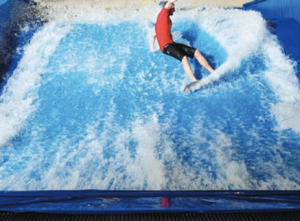A series of snowstorms over the past month and a half have dropped more snow in the unincorporated community south of Bend than it sees in an average winter season, said Brooke Snavely, communications director for the Sunriver Owners Association. An average winter season, measured from the first to last snowfall , brings about 60 inches of snow to Sunriver, he said. With the first measurable snowfall this season on Nov. 15, Sunriver has received about 70 inches as of Wednesday.
“That’s a pretty significant amount of snow on the ground in a short time,” he said this week.
This December broke a record for the most snow in the month, said Mark Smith, public works director for the Sunriver Owners Association. So far, 52.6 inches of snow has fallen in Sunriver in December, he said Wednesday . The old record, set in winter 1992-93, was 50.9 inches.
That winter saw 144 inches — 12 feet — of snow stack up in Sunriver.
The snow this December has kept public works crews for the homeowners association, tasked with clearing about 70 miles of roads and 30 miles of pathways, busy. “It has definitely made for some long days,” Smith said.
Snow does not come as much of a surprise this time of year in Sunriver. Compared with other cities and towns in Central Oregon, the community has the highest chances of a white Christmas, defined by a Christmas Day with at least an inch of snow on the ground. Historical data from the National Weather Service show Sunriver has an 87 percent chance, while Bend and Sisters have just over 30 percent chances, and Redmond, Madras and Prineville have lower odds.
What is surprising this year is how much snow has fallen already. Whether all the snow on the ground now becomes a problem when it melts remains to be seen.
“There is always a thought in the back of the mind of, ‘Where does this water go?’” Snavely said.
Sunriver neighborhoods do not have storm drains, and the roads are not flanked by sidewalks. The pathways run separate, away from the roads, leaving room for natural drainage. Snowmelt flows off the roads and pathways and soaks into the porous volcanic soil .
In 2014, a hard freeze of the ground put a hitch in this system, when the snow melted amid rainstorms. The frozen ground did not take in the water and resulted in flooding, with water creeping onto decks and into garages and crawlspaces of 30 to 40 homes, according to Bulletin archives.
Whether there is a danger of flooding all depends on how fast the snow melts and how quickly the ground can absorb it, said Jeremy Giffin, Deschutes Basin watermaster for the Oregon Water Resources Department. A warm, wet storm during winter can cause problems if it rapidly melts snow.
“If we had a big event like that come through that would definitely be a concern for flooding,” he said.





 SUNRIVER’S GRAND ILLUMINATION
SUNRIVER’S GRAND ILLUMINATION  ROCKIN’ HOLIDAY KICKOFF
ROCKIN’ HOLIDAY KICKOFF

